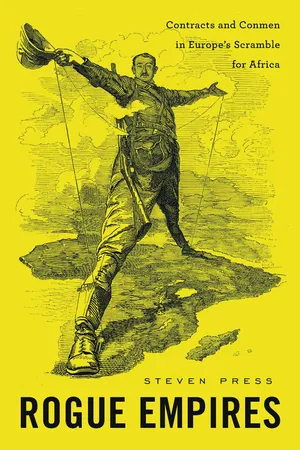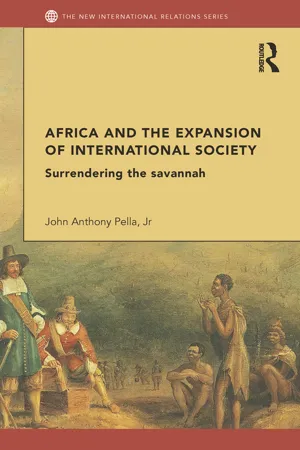Geography
Berlin Conference
The Berlin Conference was a meeting held in 1884-1885 where European powers established rules for the colonization and division of Africa. The conference aimed to prevent conflicts between European nations over African territories and to regulate trade and navigation along the Congo River. The decisions made at the conference had a significant impact on the subsequent colonization and exploitation of Africa.
Written by Perlego with AI-assistance
Related key terms
2 Key excerpts on "Berlin Conference"
- eBook - ePub
- Steven Press(Author)
- 2017(Publication Date)
- Harvard University Press(Publisher)
317 In truth, though, the gathering was an odd hybrid.On the one hand, it was understood by its participants, in the moment, as certain to have “far reaching effects” and to become “one of the most important [events] in history.”318 The conference, so predicted the German crown princess, was to arrange Africa’s future.319 And, to be sure, some attendees did just that, as when Woermann, on behalf of Germany, unilaterally negotiated with the Spanish delegate to accept certain wild Spanish claims to rule along the Río Campo, in exchange for Madrid’s compliance with German claims opposite the Bight of Biafra.320 On the other hand, the conference only addressed certain parts of Africa, and its official agenda did not so much authorize new colonization as approve colonization that had already gotten underway. Besides, far from orchestrating grand designs with precision, its participants looked downright unorganized. They hastily crammed information in the lead-up to the opening.321 Thereafter, they met only in afternoons, only for a few hours at a time, and only at irregular intervals, with notifications of postponements frequently arriving at delegates’ hotel rooms the evening before an appointment.322 Of these last instances, perhaps the most egregious derived from the British ambassador’s failure to decipher his telegraphic instructions in time for a scheduled session.323 Compounding such time troubles, most delegates at the conference felt cramped for space. They lacked typewriters and had to rely on their respective embassies in Berlin for logistical support just to record everything under discussion at meetings.324 Even the hall they met in looked overcrowded: For much of December, it housed a towering Christmas tree and gifts in addition to the horseshoe-shaped conference table.325 - John Anthony Pella, Jr(Authors)
- 2014(Publication Date)
- Routledge(Publisher)
This chapter develops this argument in detail. To do so, the first section introduces the Darwinist and nationalist ideologies that influenced the members of this competitive-type society, as well as the ways in which these ideologies helped to create this new normative perception of West-Central Africans. From there, the origins of a new European engagement with West-Central Africa are explored through the study of pro-colonial organizations, pressure groups, merchant associations and geographical societies; finally, the way in which European states ultimately sanctioned this new engagement at the Berlin Conference is analyzed. The second section turns its attention to West-Central Africa, examining how and why rulers and elites there were drawn into, and decided to cooperate with, this society. In addition, the way in which Europeans used duplicity and coercion to expand their political dominance over West-Central Africa is explored. Finally, the third section provides theoretical reflection, firstly discussing the nature of world-society activity in the case of the scramble, and secondly, how it impacted upon the expansion of international society.The climate of competition and the response at Berlin, 1859–1884
The years leading up to the Berlin Conference saw a climate of competition take shape in Europe. This climate developed in accordance with the new scientific theories and nationalistic passions that swept across the continent; its impact was particularly visible amongst the section of the population that made up the European side of the competitive-type society, which was tremendously influential throughout the scramble of Africa. These individuals began to understand existence as a competitive struggle, assume that the outcome of competition determined social progress, and also that, in the aftermath of this struggle, one could ascertain what individual, state and/or civilization was rightfully superior. And when they observed the industrial and cultural “progress” that was taking place across Western Europe, they reasoned that they, their state and their civilization were superior to all things African. Africans were thus perceived as inferior, and African territory became a target of, and outlet for, this European competition. While this climate emerged in the 1850s and this new European activity in West-Central Africa began in the late 1870s, it was not until the Berlin Conference that European states were, somewhat reluctantly, pushed into providing concrete guidelines for this new engagement with Africa. In this section, these developments are traced in detail, firstly by introducing the ideologies that influenced those who made up the competitive-type society, and secondly, by examining this society’s engagement with West-Central Africa and the response it provoked at the Berlin Conference.
Learn about this page
Index pages curate the most relevant extracts from our library of academic textbooks. They’ve been created using an in-house natural language model (NLM), each adding context and meaning to key research topics.

